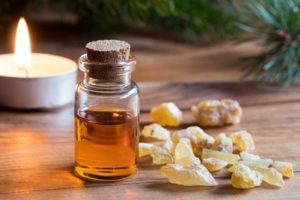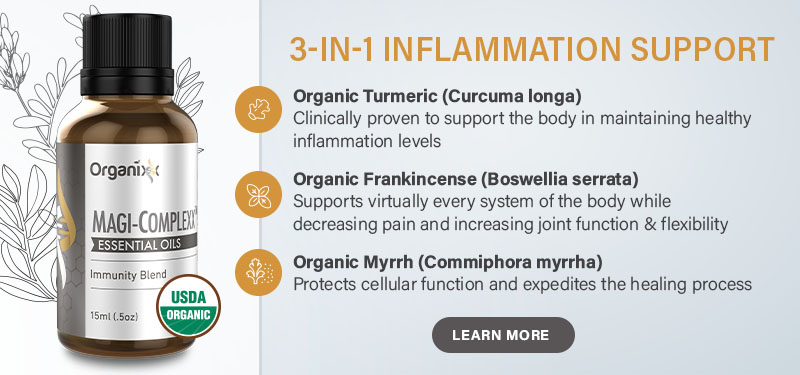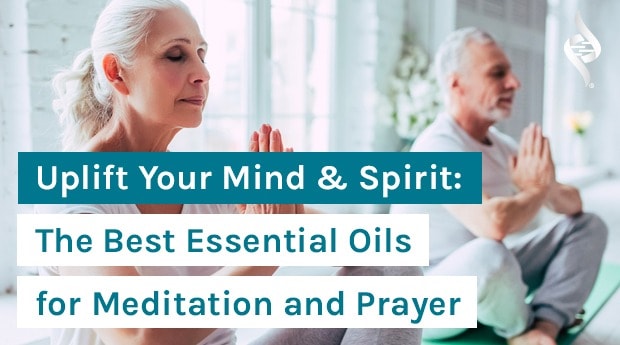Uplift Your Mind & Spirit: The Best Essential Oils for Meditation and Prayer
In a hurry? Click here to read the Article Summary...
If you’re like many new or experienced users of essential oils, you’re more than likely familiar with the physical benefits that essential oils offer. For instance, helping to calm a headache, soothing and relaxing the body in the bath, or as a great pick-me-up in a diffuser when your energy levels are dwindling.
But did you know that certain essential oils have also been used since ancient times specifically for spiritual reflection? If you are in need of some peace or soothing troubled emotions, incorporating essential oils for meditation or prayer into your reflective practice can enhance your ability to go within.
The Practical and Mystical History of Essential Oils
The first people to distill and refine the essential phytonutrients and aromatic elements of plants (known as “terpenes”) utilized  them for physical well-being. They also incorporated them into their spiritual practice in religious ceremonies, meditation, and prayer.
them for physical well-being. They also incorporated them into their spiritual practice in religious ceremonies, meditation, and prayer.
Over time, certain regional plant oils rose to prominence because of their ability to ground, center, and uplift.
The earliest records of what we now call “essential oils” (in times past, they were aromatics, anointing oils, and perfumes) dates to around 4,500 BC in Egypt.
Scholars such as Turkish natural medicine researcher K. Husnu Can Baser speculate that oils of cedarwood, frankincense, and myrrh were used in abundance amongst the Egyptian elite. This was not only because of their disinfectant and anti-inflammation properties but also for their ability to elevate the spirit.
Frankincense, Myrrh, and “Gold:” Essential Oils in the Bible
Essential oils eventually flourished and were used for a variety of reasons all over the world. The Greeks used essential oils as perfumes, the Romans in their famous baths and, in China, aromatic oils were first mentioned in the Shennong Bencao Jing, one of the first written medical texts, circa 3,000 BC.
Most of us in the West, however, are most familiar with essential oils because of the many references to them in biblical texts.
In the Bible, perhaps the most distinguished re ference to certain herbs that are still seen in essential oil form today had to do with the gifts that the Three Wise Men brought to Jesus upon his birth.
These gifts were frankincense, myrrh, and “gold,” which according to some scholars, could have been the Ayurvedic spice called turmeric. During the Spice Trade, turmeric was known as the “golden spice.”
The Bible gives us a lot of other sweet-smelling clues as to which essential oils are best for times when we want to calm, ground, and find peace within ourselves and with our Creator.
We can see this in the so-called “anointing oils” that was first used by the religious elite in the Old Testament and then used by Jesus and his disciples. Although the exact ingredients probably varied through the years, the Biblical anointing oils mainly consisted of myrrh, sweet cinnamon, cassia, and an herb known as “kaneh bosom,” which some scholars suspect was cannabis.
Other Biblical historians, such as Dr. David Steward, author of Healing Oils of the Bible, include frankincense, sandalwood, cypress, hyssop, cedarwood, myrtle, and cistus (also known as Rose of Sharon) amongst the “anointing oils.”
9 Essential Oils for Times of Contemplation & Reflection
 As the Bible, as well as other ancient texts, show – and eons of practice have demonstrated – there are specific scents which help to put one in a more focused, “spiritual,” and heart-centered state of mind.
As the Bible, as well as other ancient texts, show – and eons of practice have demonstrated – there are specific scents which help to put one in a more focused, “spiritual,” and heart-centered state of mind.
Here are nine essential oils considered to be beneficial for these purposes:
- Frankincense: The fragrance of Frankincense has been known for centuries for its ability to allow a person to ease into a more “spiritual” and “uplifted” state of mind.
- Cedarwood: Cedarwood essential oil comes from the cedar tree, the most often mentioned tree in the Bible. It has long been considered to bring about wisdom, protection, and abundance.
- Myrrh: Myrrh was revered by many cultures in the Middle East, where the resin is extracted from the small, thorny Commiphora tree. It was also called the “Tears of Horus” by the Egyptians and later referred to as “Holy Oil” by the Ancient Hebrew, where it was said to be more valuable than gold during that time.
- Sandalwood: Sandalwood is said to help with emotional healing.
- Palo Santo: Coming from South America, Palo Santo (Bursera graveolens) is also called “Holy Wood” and is considering to be very grounding for the body and the mind.
Other essential oils often used for reflection and mood enhancement include: - Vetiver oil: Vetiver is thought to subtly assist with focus.
- Ylang Ylang: Ylang Ylang has been shown to help to lift your mood.
- Chamomile: to calm and relieve anxiety.
- Lavender: to calm and relax both body and mind.
Even though the essential oils listed above may be the most-often used for prayer and meditation, in truth, any essential oil that calls to you when you sit down for a few quiet moments of reflection can be a contender for beneficial use.
Why? Simply because this is a meditation or prayer time for you, where your purpose is to get grounded, get quiet, and be open.
Maybe you needed that citrus oil in your diffuser to help you recall a sweet memory that is relevant to whatever you are going through now. Or perhaps a touch of lavender essential oil was required to calm your mind and simply “be” for five minutes?
There are no wrong ways of using essential oils to enhance the quiet time you spend with yourself. The sky (and the heavens) is the limit!
7 Steps for Enhancing Your Meditation Practice or Prayer Time with Essential Oils
Here are seven simple steps for settling into prayer and meditation using essential oils:

- Take a deep breath and then let your breath out fully.
- Light a candle if you wish.
- Think about your focus for this time, or allow your time just to be without a particular focus.
- Settle into silence for a few seconds and allow a particular scent to come to you. Maybe one pops into your mind automatically, or maybe a memory or emotion reminds you of it. Whatever scent comes into your mind first, go for it (remember, there are no wrong answers here!).
- Place the essential oil of your choosing in your diffuser, on your palms for a simple inhale, or use it in any other way that feels right to you so that you can benefit from its fragrance throughout your reflective time.
- Settle in for some connection time and enjoy this peaceful break from the rest of your busy day.
- Optional: after your practice has ended, you may wish to write your observations in a journal. Take note of how the presence of the essential oil enhanced your experience.
No One Knows How Essential Oils Work for Meditation and Prayer (Just That They Do!)
Why have certain essential oils been associated with meditation and prayer for so long? It could be a product of the emotions that they evoke. Science says that our sense of smell is the only one that connects with the emotions first before the rational brain has a chance to make sense of it.
It could also be a product of collective memory since many of us can recall special experiences in places where we may have smelled these scents. Or it could be about something more. What is crystal clear based on the span of time they’ve been employed for this use, however, is that they work!
The powerhouse trio of herbs in Magi-Complexx Essential Oil provides the strongest, most synergistic healing effect, helping sufferers of arthritis pain, constant muscle aches and pains, neuropathy, systemic inflammation, slowed wound healing, circulatory challenges, as well as skin irritations like eczema, psoriasis, and acne.

 Sources:
Sources:
Article Summary
Certain essential oils have been used since ancient times specifically for spiritual reflection.
Incorporating essential oils for meditation or prayer into your reflective practice can enhance your ability to go within.
The Biblical anointing oils mainly consisted of myrrh, sweet cinnamon, cassia, and an herb known as “kaneh bosom,” which some scholars suspect was actually cannabis.
Science says that our sense of smell is the only one that connects with the emotions first before the rational brain has a chance to make sense of it.
9 Essential Oils for Times of Contemplation & Reflection
1. Frankincense
2. Cedarwood
3. Myrrh
4. Sandalwood
5. Palo Santo
6. Vetiver oil
7. Ylang Ylang
8. Chamomile
9. Lavender





Your products sound good can you give me some information on tumaric thank you
Hi Maria, thank you for your interest.
We would be more than happy to give you some information on our Turmeric 3D.
Our fermented Turmeric 3D helps maintain healthy inflammation, enhances and elevates mood, maintains healthy joints, promotes heart health, and maintains healthy lung function.
If you would like to learn more, feel free to check out the following links:
https://shop.organixx.com/collections/all-products/products/turmeric-3d
https://organixx.com/turmeric-3d/
Thank you so much. We hope you have a wonderful day!
I use the Relaxx in my diffuser in the infant classroom. It helps with naps and overall calming for those babies.
That's great to hear, Terri!
Thank you.
You're very welcome, Rosemary!